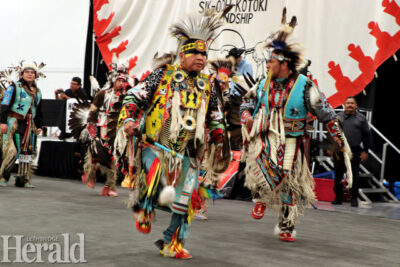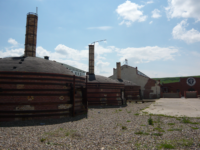Pipe offering leads into reconciliation and healing
By Lethbridge Herald on October 2, 2023.
 Dancers cross the floor during the grand entry as part of the Sik-Ooh-Kotoki Friendship Society powwow Saturday at the Agri-Food Hub and Trade Centre, which followed a pipe offering earlier in the day.
Herald photo by Steffanie Costigan
Dancers cross the floor during the grand entry as part of the Sik-Ooh-Kotoki Friendship Society powwow Saturday at the Agri-Food Hub and Trade Centre, which followed a pipe offering earlier in the day.
Herald photo by Steffanie CostiganSteffanie Costigan – LETHBRIDGE HERALD – Local Journalism Initiative Reporter
The Sik-Ooh-Kotoki Friendship Society held a pipe offering ceremony in honour of reconciliation at Saturday.
Theron Black, president of the Honouring Traditions and Reconciliation Society, said the pipe offering was a good way to lead into reconciliation.
“We wanted to do a pipe offering to start our reconciliation week, so we can all be able to lead in a good way, Black said.
Following the ceremony, Siksaapo’p Patrick Black Plume, leader of the Grey Horse Society, provided a history of the pipe offering and said that in the 70s the chief and council came up with a way they could share their culture through a pipe offering. He also explained the difference between a pipe offering and pipe ceremony.
“They talk to the elders, and they said we can do a pipe offering where we all experience,” Black Plume said. “There’s a difference between pipe ceremony and a pipe offering. Pipe offering is more open to the public and whoever wants to sit in that circle. You’ve seen how we sat in a circle there. We always sit in a circle, and we always sit on the ground getting close to Mother Earth,.”
Blood Tribe councillor Travis Plaited Hair said he prefers to call it a pipe offering instead of pipe ceremony because of the Blackfoot culture.
“The pipe offering, which is what I prefer to call it; because in Blackfoot when a person approaches the elder for prayers, he’s offering his pipe to that elder to pray for whatever the reason maybe,” said Plaited Hair.
Black pointed out Indigenous speakers experience a lot of emotions when recalling their past trauma and sharing their stories.
“It was such an emotional week for all the people who shared your stories, had to relive their stories, to have helped understand non-Aboriginal people and what we do about the truth about the reconciliation and what it all entitles and what it all means,” Black said.
He added Indigenous communities have opened their cultural events up to the rest of the community to learn more about Indigenous culture.
“As you know, we always encourage non-Aboriginal people to come into our events, and to be a part of it. And so far, it’s only been the Aboriginal population, and it’s been a little bit slower, but we’re still working with them and come from a place of kindness, to get them to be at the same level.”
Black Plume said it’s a good feeling to see non-Indigenous community members participating in Indigenous cultural events.
“I’m always honoured and glad to see our non-native friends, our friends from the outside joining within our ceremonies, like you’ve seen today. It’s a pipe offering. It’s kind of like a ceremony where those that were invited to sit in a circle had the chance to get the blessing from our elder today.”
Black noted the agencies raised a considerable amount of money for the Indigenous community to help them overcome past trauma.
“We came up with $110,000. That is going all back out into their community, and our guests, our staff that are there. We asked for good blessing throughout the whole year that our agencies are able to help our people in need and find successes in them in what they’re doing.”
Black said the pipe offering is not only a blessing, but a healing, as well.
“When we come from a kind space, that’s when we can be able to get the process and, and in dealing with reconciliation, residential schools, everything that with our addictions that are struggling, we always pray for them that they’re going to lead their way back to our culture.”
Black Plume said no matter the trauma’s Indigenous people have had to endure it will not stop them from being Niitsitapi.
“We do that to, I guess, to let people know that our culture is still going. We haven’t stopped. We’re still here, we’ll always be here, no matter what we go through. We’ll always be here as Niitsitapi real people.”
21-20



